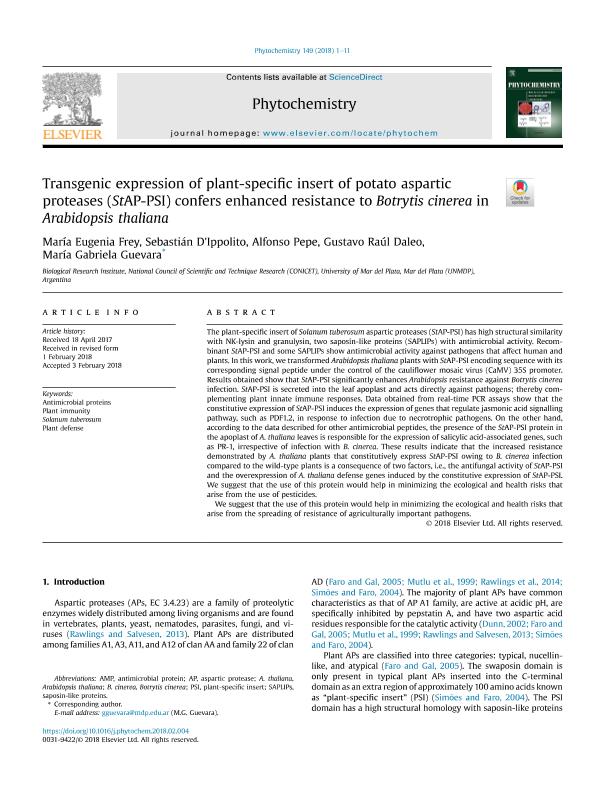Artículo
Transgenic expression of plant-specific insert of potato aspartic proteases (StAP-PSI) confers enhanced resistance to Botrytis cinerea in Arabidopsis thaliana
Frey, María Eugenia ; D'ippólito, Sebastián
; D'ippólito, Sebastián ; Pepe, Alfonso
; Pepe, Alfonso ; Daleo, Gustavo Raul
; Daleo, Gustavo Raul ; Guevara, Maria Gabriela
; Guevara, Maria Gabriela
 ; D'ippólito, Sebastián
; D'ippólito, Sebastián ; Pepe, Alfonso
; Pepe, Alfonso ; Daleo, Gustavo Raul
; Daleo, Gustavo Raul ; Guevara, Maria Gabriela
; Guevara, Maria Gabriela
Fecha de publicación:
05/2018
Editorial:
Pergamon-Elsevier Science Ltd
Revista:
Phytochemistry
ISSN:
0031-9422
Idioma:
Inglés
Tipo de recurso:
Artículo publicado
Clasificación temática:
Resumen
The plant-specific insert of Solanum tuberosum aspartic proteases (StAP-PSI) has high structural similarity with NK-lysin and granulysin, two saposin-like proteins (SAPLIPs) with antimicrobial activity. Recombinant StAP-PSI and some SAPLIPs show antimicrobial activity against pathogens that affect human and plants. In this work, we transformed Arabidopsis thaliana plants with StAP-PSI encoding sequence with its corresponding signal peptide under the control of the cauliflower mosaic virus (CaMV) 35S promoter. Results obtained show that StAP-PSI significantly enhances Arabidopsis resistance against Botrytis cinerea infection. StAP-PSI is secreted into the leaf apoplast and acts directly against pathogens; thereby complementing plant innate immune responses. Data obtained from real-time PCR assays show that the constitutive expression of StAP-PSI induces the expression of genes that regulate jasmonic acid signalling pathway, such as PDF1.2, in response to infection due to necrotrophic pathogens. On the other hand, according to the data described for other antimicrobial peptides, the presence of the StAP-PSI protein in the apoplast of A. thaliana leaves is responsible for the expression of salicylic acid-associated genes, such as PR-1, irrespective of infection with B. cinerea. These results indicate that the increased resistance demonstrated by A. thaliana plants that constitutively express StAP-PSI owing to B. cinerea infection compared to the wild-type plants is a consequence of two factors, i.e., the antifungal activity of StAP-PSI and the overexpression of A. thaliana defense genes induced by the constitutive expression of StAP-PSI. We suggest that the use of this protein would help in minimizing the ecological and health risks that arise from the use of pesticides. We suggest that the use of this protein would help in minimizing the ecological and health risks that arise from the spreading of resistance of agriculturally important pathogens.
Palabras clave:
ANTIMICROBIAL PROTEINS
,
PLANT DEFENSE
,
PLANT IMMUNITY
,
SOLANUM TUBEROSUM
Archivos asociados
Licencia
Identificadores
Colecciones
Articulos(IIB)
Articulos de INSTITUTO DE INVESTIGACIONES BIOLOGICAS
Articulos de INSTITUTO DE INVESTIGACIONES BIOLOGICAS
Citación
Frey, María Eugenia; D'ippólito, Sebastián; Pepe, Alfonso; Daleo, Gustavo Raul; Guevara, Maria Gabriela; Transgenic expression of plant-specific insert of potato aspartic proteases (StAP-PSI) confers enhanced resistance to Botrytis cinerea in Arabidopsis thaliana; Pergamon-Elsevier Science Ltd; Phytochemistry; 149; 5-2018; 1-11
Compartir
Altmétricas



